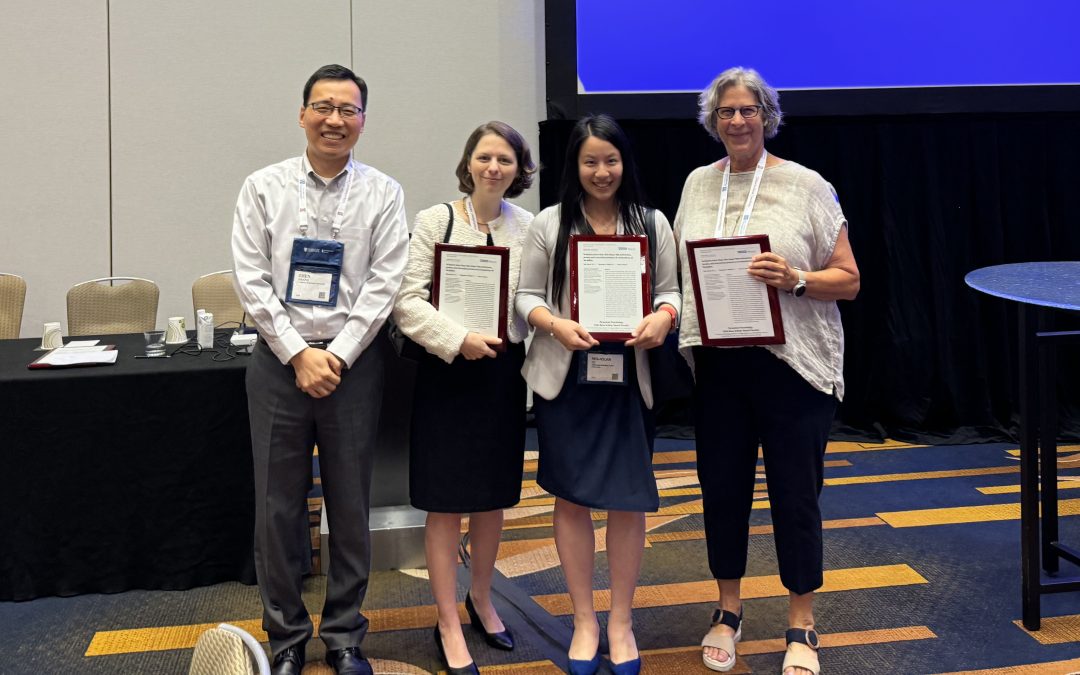Research by University of Florida management professor among the best of the year
Joyce Bono’s research highlights that while attractiveness helps in the hiring process, confidence is king to securing a job.
Research by Joyce Bono, W.A. McGriff, III Professor at the University of Florida Warrington College of Business, was named the second-best paper of the year by Personnel Psychology, a leading journal focusing on psychological research centered around people at work.
“This award was really special to me in part because of the people involved,” said Bono. “It was so much fun seeing [co-authors] Min-Hsuan and Elisabeth and celebrating this award together at the Academy of Management meetings. But this research is also special to me because it is so practical; it shows people that engaging in behavior that makes them feel confident can really make a difference.”

From left: Warrington Ph.D. alumnae Min-Hsuan Tu and Elisabeth Gilbert and W.A. McGriff, III Professor Joyce Bono.
Published in 2021, Bono and her co-authors Min-Hsuan Tu (Ph.D. ’19) of the University of Buffalo and Elisabeth Gilbert (Ph.D. ’19) of Washington and Lee University, sought to understand the nonverbal cues attractive people use that aid them in the hiring process.
While we’d like to believe that hiring managers aren’t ‘judging books by their covers,’ decades of research have shown that people who are more attractive are more likely to get ahead in their careers. While some of this may be due to bias on the part of hiring managers, Bono, Tu and Gilbert’s research finds that at least some of the reason attractive people have better luck in their careers is because they have a greater sense of power, and it shines through when they present themselves.
“The idea is that because attractive people have had different opportunities and social experiences, like being invited to interact with others, they develop communication skills and learn how to present themselves better,” said Tu. “For example, they are more confident and enthusiastic and have a better sense of power. That power is something they can utilize in the hiring process.”
In a series of two studies, Tu, Gilbert and Bono asked research participants to record their elevator pitch – a mainstay of interviews. In their first study, the researchers found that attractive individuals were perceived as more hirable in part because of their stronger nonverbal presence.
In their second study, Tu, Gilbert and Bono pinpoint a solution for those who aren’t blessed with beauty. The researchers asked certain study participants to adopt a ‘power pose’ prior to giving their elevator pitch. In a power pose, participants stand with their feet shoulder-width apart, hands on hips, chest out and chin up.
For those participants who held the power pose before delivering their elevator pitch, they were able to adopt an effective nonverbal presence, which was associated with higher hirability ratings, particularly for less attractive individuals.
“I like this study because it offers hope for the rest of us,” said Gilbert. “It’s not a perfect solution, especially because it puts the onus on interviewees to counteract societal bias. But it is something they can do to help themselves.”
The researchers also note that beyond power posing, people who are looking to boost their feeling of power before an interview simply need to do something that makes them feel self-assured.
“Whether it’s the first interview, or the first day on the job, or at any important presentation, you should focus on what makes you feel most confident,” recommended Bono. “Whether that is wearing a special jacket, or standing tall, or practicing a few power poses.”




